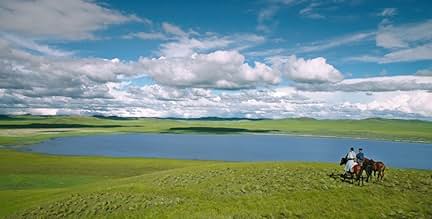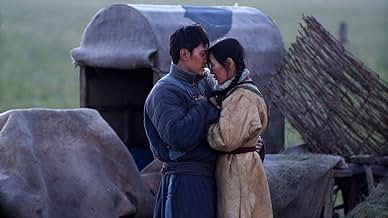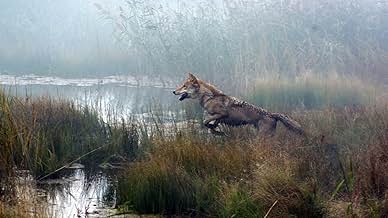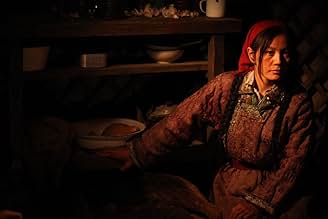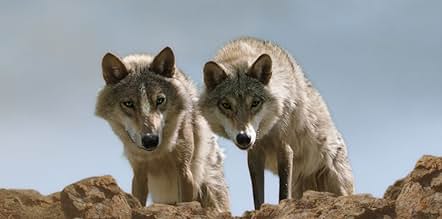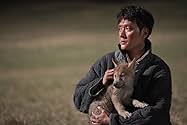CALIFICACIÓN DE IMDb
6.6/10
6.4 k
TU CALIFICACIÓN
Durante la Revolución Cultural China, un joven estudiante de ciudad se va a vivir con unos pastores mongoles, donde adopta un cachorro de lobo.Durante la Revolución Cultural China, un joven estudiante de ciudad se va a vivir con unos pastores mongoles, donde adopta un cachorro de lobo.Durante la Revolución Cultural China, un joven estudiante de ciudad se va a vivir con unos pastores mongoles, donde adopta un cachorro de lobo.
- Dirección
- Guionistas
- Elenco
- Premios
- 20 premios ganados y 16 nominaciones en total
Ankhnyam Ragchaa
- Gasma
- (as Ankhnyam Rachaa)
Baasanjav Mijid
- Bilig
- (as Basen Zhabu)
Gexige Baoyin
- Batu
- (as Baoyingexige)
Opiniones destacadas
It saddens me that this film will not receive a wider audience. With an English title of "Wolf Totem" very few outside of France or China will be tempted to see it, but it is their loss.
Wolf Totem manages to bring to the big screen the majesty and mystery of wolves. But it is much more than a National Geographic or Animal Planet documentary. (Although those in themselves would be a great success.) It also invites us into the world of Inner Mongolia and tells a compelling tale of human love and loss. This is not Le Renard et L'infant (The Fox and the Child). It succeeds in telling a much grander tale. The acting is all very believable and unlike the usual over-the-top soap opera-esque fare available in most Chinese cinema.
But come for the wolves. I could howl their praises all night long.
Wolf Totem manages to bring to the big screen the majesty and mystery of wolves. But it is much more than a National Geographic or Animal Planet documentary. (Although those in themselves would be a great success.) It also invites us into the world of Inner Mongolia and tells a compelling tale of human love and loss. This is not Le Renard et L'infant (The Fox and the Child). It succeeds in telling a much grander tale. The acting is all very believable and unlike the usual over-the-top soap opera-esque fare available in most Chinese cinema.
But come for the wolves. I could howl their praises all night long.
French filmmaker Jean-Jacques Annaud's China-France co-production is his third enterprise tackling with human-animal equilibrium, after THE BEAR (1988) and TWO BROTHERS (2004), WOLF TOTEM is adapted from a popular semi-autobiographical Chinese novel of the same title and is shot in the majestic Inner Mongolian steppe.
During China's Cultural Revolution, in 1969, two students from Beijing, Chen Zhen (Feng) and Yang Ke (Dou) are assigned to the steppe to teach local Mongolian nomads Mandarin and smooth the process of cultural integration. They are under the aegis of Bilig (Mijid), the head of the nomads, a sage mind who inculcates them the precept of the balanced co-existence between mankind and indigenous wolves. But, a pervading human force of greed and self-seeking would soon disrupt the well-maintained balance, wolves are deprived of their sustenance and during one blizzard night, driven by hunger, they attack a horde of horses and result in great casualty, including Bilig's son (although it is an accident). Retaliation is conducted under the command of an apparatchik (Yin), many wolf cubs are perished for the sake of their skins, but Chen saves one cub, secretly raises it like a pet and attachment grows. As often, one considers him or herself doing a good deed would only realise later in the stage it is a mistake, domesticating a feral wolf isn't something worth commending, and it is noteworthy that Annaud doesn't vindicate Chen's behavior by stating that the cub is bereft or in somewhat danger, Chen's behavior is solely out of his own soft spot, with no regard of the consequence for the cub itself, only after Bilig's sensible advice, Chen would right his wrongs to prepare and train the young wolf for its return to its natural territory, and one should remember, it is always a rookie mistake trying to extract a trickle of humanity out of the wild creatures, mutual connection might be able to achieved, but don't belabor yourself with any illusions of any reciprocal gestures.
The stand-off between humans and wolves will reach its heroic climax after the ravenous wolf pack assails a sheep corral during one night and this time, the entire pack is almost being extirpated by bullets and unrelieved vehicle chase, witnessed powerlessly for Chen, if anything, powerless is the omnipresent feeling, wherever humans tread, there are black sheep undermining the natural grandeur and harmony, disasters are bound to ensue, a central message cannot be dissipated by the film's lugubriously concocted positive vibe in the end. It is a big relief Annaud doesn't settle for facile wishful-thinking or radical aggression in its tonality, so that the film manage to retain an organic slant which conforms with his previous similar oeuvres.
The striking animal stunts orchestrated by dexterous trainer Andrew Simpson greatly hone up the set pieces, especially against its ferocious surroundings (the scenes of frozen animal corpses are manifestations of the primordial power of nature), and it goes without saying the film is a continuous landscape-porn (plus two emphatic examples of cloudscape), although sometimes its immaculateness unfittingly instigates the suspicion of an overachieved CGI-preening during the post-production.
The human cast understandably takes a back seat from its awe-inspiring canine counterpart, but the dialogues sound clunky to a Chinese ear, and the character development barely exists, since when Chen and Gasma (Ragchaa), the widow and daughter-in-law of Bilig, become an item? The emphasis is so top-heavy on Chen and his wolf cub, which makes the romantic subplot comes off as abrupt and fluffy. In the main, WOLF TOTEM doesn't shortchange its forte: the spectacular vista and pulsating action sequences, and it also circumspectly bypasses the sensitive political agenda (the film was a mammoth box-office player two years ago during the golden spell of Chinese Spring Festival) and allows the story itself to stimulate reflections on a broader picture: human vs. nature, simply within ecological parameters.
During China's Cultural Revolution, in 1969, two students from Beijing, Chen Zhen (Feng) and Yang Ke (Dou) are assigned to the steppe to teach local Mongolian nomads Mandarin and smooth the process of cultural integration. They are under the aegis of Bilig (Mijid), the head of the nomads, a sage mind who inculcates them the precept of the balanced co-existence between mankind and indigenous wolves. But, a pervading human force of greed and self-seeking would soon disrupt the well-maintained balance, wolves are deprived of their sustenance and during one blizzard night, driven by hunger, they attack a horde of horses and result in great casualty, including Bilig's son (although it is an accident). Retaliation is conducted under the command of an apparatchik (Yin), many wolf cubs are perished for the sake of their skins, but Chen saves one cub, secretly raises it like a pet and attachment grows. As often, one considers him or herself doing a good deed would only realise later in the stage it is a mistake, domesticating a feral wolf isn't something worth commending, and it is noteworthy that Annaud doesn't vindicate Chen's behavior by stating that the cub is bereft or in somewhat danger, Chen's behavior is solely out of his own soft spot, with no regard of the consequence for the cub itself, only after Bilig's sensible advice, Chen would right his wrongs to prepare and train the young wolf for its return to its natural territory, and one should remember, it is always a rookie mistake trying to extract a trickle of humanity out of the wild creatures, mutual connection might be able to achieved, but don't belabor yourself with any illusions of any reciprocal gestures.
The stand-off between humans and wolves will reach its heroic climax after the ravenous wolf pack assails a sheep corral during one night and this time, the entire pack is almost being extirpated by bullets and unrelieved vehicle chase, witnessed powerlessly for Chen, if anything, powerless is the omnipresent feeling, wherever humans tread, there are black sheep undermining the natural grandeur and harmony, disasters are bound to ensue, a central message cannot be dissipated by the film's lugubriously concocted positive vibe in the end. It is a big relief Annaud doesn't settle for facile wishful-thinking or radical aggression in its tonality, so that the film manage to retain an organic slant which conforms with his previous similar oeuvres.
The striking animal stunts orchestrated by dexterous trainer Andrew Simpson greatly hone up the set pieces, especially against its ferocious surroundings (the scenes of frozen animal corpses are manifestations of the primordial power of nature), and it goes without saying the film is a continuous landscape-porn (plus two emphatic examples of cloudscape), although sometimes its immaculateness unfittingly instigates the suspicion of an overachieved CGI-preening during the post-production.
The human cast understandably takes a back seat from its awe-inspiring canine counterpart, but the dialogues sound clunky to a Chinese ear, and the character development barely exists, since when Chen and Gasma (Ragchaa), the widow and daughter-in-law of Bilig, become an item? The emphasis is so top-heavy on Chen and his wolf cub, which makes the romantic subplot comes off as abrupt and fluffy. In the main, WOLF TOTEM doesn't shortchange its forte: the spectacular vista and pulsating action sequences, and it also circumspectly bypasses the sensitive political agenda (the film was a mammoth box-office player two years ago during the golden spell of Chinese Spring Festival) and allows the story itself to stimulate reflections on a broader picture: human vs. nature, simply within ecological parameters.
This movie is based on a semi-autobiographical novel and I think they did a pretty good job in turning a literary piece of art into a cinematic experience. This is one of the reasons I gave this movie 7 stars. Other reasons included great performances (extremely natural and believable), beautiful scenery and the amount of empathy the creatures from this movie were able to develop in me from beginning to end. Of course, all of the creatures except...humans. Ok, you can try to understand them, but if you are a sensitive person you can't help but hate every single character here except the Chinese student who adopted the little wolf. The main character is the only character with a sensitive heart and a pure soul. Yes, there is a little kid from the village, I'm sorry. I studied Chinese language and literature and I spent some time in China while I was a college student, I think this is is a very accurate portrayal of Chinese people, no matter if we are talking about people from big cities or countryside. Unfortunately, it is very difficult to find a highly sensitive Chinese person. They can be wise and smart, but they are practical and cruel. And I couldn't enjoy the movie. Being a huge animal lover, my heart was shaking all of the time. The scenes are highly graphic, brutal and disturbing. I agree that these types of movies are necessary for us to raise our awareness about many things that happen between men and animals and to try to change and improve the relationship somehow. I liked the ending scene because in a certain way it blended sensitivity with "coldness", wild warrior spirit of the wolf was compared with still naive and culturally embedded spirit of the young Chinese student and they did that in a strong and emotional way. (I am not a native English speaker, so please don't laugh if something sounds strange in this review ;) ). All in all, I think that people who really love animals will have a really hard time while watching this movie.
-Wolf Totem (2015) movie review: -Wolf Totem is a Chinese film, made by the French director of Troy, based on the novel (based on a true story) following two Chinese students staying in a modern (1960s) nomadic group of Mongols who raise horses and sheep. They live in a somewhat dangerous area inhabited by Mongolian wolves, so when a corporate residential manager decides to essentially steal food from the smartest species of wolf on the planet, the wolves are forces to get into a turf was with the Mongolian shepherds. It is like the set-up for The Last Samurai if the samurai were the wolves.
-This ambitious endeavor paid off with a massive visual appeal, fantastic production value, and an incredibly emotional story. It was quite a great film.
-I'll go ahead and say this, if you don't like animal deaths or tragedy that might come with said true events surrounding the decline of two impressive races, Mongolians and Mongolian wolves, you will not enjoy this film. However, the story is well told and filled with smart writing to drive the point home and beyond. You will get more that you bargained for.
-The film takes a short while to really pick up, but it has a good pace for most of the film.
-The acting is very good. I do not know any of the actors or wolf actors in it, but the actors did a compelling job and the wolves were so much better than just having stock footage of wolves.
-The characters offered a lot to the story. Each character represents a human trait in a way. The main character, Chen Zhen, offers the hope in humanity and the attempt to see the best during dire situations. His best friend character is more of the ambitions, progressive look at those people who just don't care. There is the village leader, who represents the old ways and greatness of tradition. And of course, the sorta-villain who represents everything wrong with change and industrialization.
-The music is the best thing about it. James Horner composes one of his best, most beautiful, and most heart-string-pulling scores. It was actually how I found this film in the first place.
-Again, the design on the film is visually stunning. Very good practical effects, cinematography, and impressively good wolf training. Fun fact: This project was turned down by every major Chinese director because they thought it too difficult to train Mongolian wolves.
-It is an emotionally draining film and the true story makes it even harder to enjoy, but it is truly a compelling, well made, beautiful film that I think is totally worth checking out! -Wolf Totem does not have a rating, but it has a PG-13 amount of violence and language, so I would say PG-13. Makes sense.
-This ambitious endeavor paid off with a massive visual appeal, fantastic production value, and an incredibly emotional story. It was quite a great film.
-I'll go ahead and say this, if you don't like animal deaths or tragedy that might come with said true events surrounding the decline of two impressive races, Mongolians and Mongolian wolves, you will not enjoy this film. However, the story is well told and filled with smart writing to drive the point home and beyond. You will get more that you bargained for.
-The film takes a short while to really pick up, but it has a good pace for most of the film.
-The acting is very good. I do not know any of the actors or wolf actors in it, but the actors did a compelling job and the wolves were so much better than just having stock footage of wolves.
-The characters offered a lot to the story. Each character represents a human trait in a way. The main character, Chen Zhen, offers the hope in humanity and the attempt to see the best during dire situations. His best friend character is more of the ambitions, progressive look at those people who just don't care. There is the village leader, who represents the old ways and greatness of tradition. And of course, the sorta-villain who represents everything wrong with change and industrialization.
-The music is the best thing about it. James Horner composes one of his best, most beautiful, and most heart-string-pulling scores. It was actually how I found this film in the first place.
-Again, the design on the film is visually stunning. Very good practical effects, cinematography, and impressively good wolf training. Fun fact: This project was turned down by every major Chinese director because they thought it too difficult to train Mongolian wolves.
-It is an emotionally draining film and the true story makes it even harder to enjoy, but it is truly a compelling, well made, beautiful film that I think is totally worth checking out! -Wolf Totem does not have a rating, but it has a PG-13 amount of violence and language, so I would say PG-13. Makes sense.
I have to admit, when I saw the cover I thought this was going to be a documentary. But it's a feature length film and it is a very well shot one. It's about nature, it's about humans and it's about wild life. Especially in the region depicted as someone else already stated well in their commentary to the film here on IMDb.
This will not be everyones cup of tea, but if you like nature movies with a dramatic twist, you probably will like this too. You can't compare it to Revenant, which is something I kind of expected to find here, but fortunately that wasn't the case. The movie really brings the animals to life, framing them in a way and shooting them to make them not only characters but someone to root for and feel for too. If you are an animal friend, I don't even need to be telling you this. If not, you might not be as moved as others ...
This will not be everyones cup of tea, but if you like nature movies with a dramatic twist, you probably will like this too. You can't compare it to Revenant, which is something I kind of expected to find here, but fortunately that wasn't the case. The movie really brings the animals to life, framing them in a way and shooting them to make them not only characters but someone to root for and feel for too. If you are an animal friend, I don't even need to be telling you this. If not, you might not be as moved as others ...
¿Sabías que…?
- ConexionesReferenced in At the Movies: Cannes Film Festival 2013 (2013)
Selecciones populares
Inicia sesión para calificar y agrega a la lista de videos para obtener recomendaciones personalizadas
- How long is Wolf Totem?Con tecnología de Alexa
Detalles
- Fecha de lanzamiento
- Países de origen
- Sitio oficial
- Idiomas
- También se conoce como
- Wolf Totem
- Locaciones de filmación
- Xilingol Grassland, Inner Mongolia, China(major location)
- Productoras
- Ver más créditos de la compañía en IMDbPro
Taquilla
- Presupuesto
- USD 38,000,000 (estimado)
- Total en EE. UU. y Canadá
- USD 210,591
- Total a nivel mundial
- USD 125,837,070
- Tiempo de ejecución2 horas 1 minuto
- Color
- Mezcla de sonido
- Relación de aspecto
- 2.35 : 1
Contribuir a esta página
Sugiere una edición o agrega el contenido que falta

Principales brechas de datos
What is the Brazilian Portuguese language plot outline for Le dernier loup (2015)?
Responda






